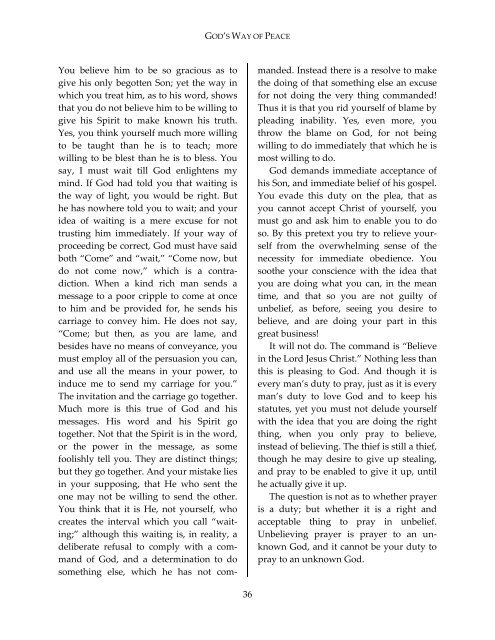God's Way of Peace by Horatius Bonar, D.D.
The seasoned Scottish pastor wrote this short devotional for those suffering from guilt, anxiety, or the consequences of sin. He writes with neither chastisement nor condemnation, but rather immediately directs his readers to Christ’s gift of salvation through his death and resurrection. Bonar reminds all that the Gospel offers hope for the sinner and comfort for the troubled, for God’s perfect, constant grace never fails those who accept it. From Bonar’s time to the present, people have found peace with God afresh through this book. Many people report having read it several times, and turning to it again and again when troubles arise. Kathleen O’Bannon CCEL Staff
The seasoned Scottish pastor wrote this short devotional for those suffering from guilt, anxiety, or the consequences of sin. He writes with neither chastisement nor condemnation, but rather immediately directs his readers to Christ’s gift of salvation through his death and resurrection. Bonar reminds all that the Gospel offers hope for the sinner and comfort for the troubled, for God’s perfect, constant grace never fails those who accept it. From Bonar’s time to the present, people have found peace with God afresh through this book. Many people report having read it several times, and turning to it again and again when troubles arise.
Kathleen O’Bannon
CCEL Staff
You also want an ePaper? Increase the reach of your titles
YUMPU automatically turns print PDFs into web optimized ePapers that Google loves.
GOD’S WAY OF PEACE<br />
You believe him to be so gracious as to<br />
give his only begotten Son; yet the way in<br />
which you treat him, as to his word, shows<br />
that you do not believe him to be willing to<br />
give his Spirit to make known his truth.<br />
Yes, you think yourself much more willing<br />
to be taught than he is to teach; more<br />
willing to be blest than he is to bless. You<br />
say, I must wait till God enlightens my<br />
mind. If God had told you that waiting is<br />
the way <strong>of</strong> light, you would be right. But<br />
he has nowhere told you to wait; and your<br />
idea <strong>of</strong> waiting is a mere excuse for not<br />
trusting him immediately. If your way <strong>of</strong><br />
proceeding be correct, God must have said<br />
both “Come” and “wait,” “Come now, but<br />
do not come now,” which is a contradiction.<br />
When a kind rich man sends a<br />
message to a poor cripple to come at once<br />
to him and be provided for, he sends his<br />
carriage to convey him. He does not say,<br />
“Come; but then, as you are lame, and<br />
besides have no means <strong>of</strong> conveyance, you<br />
must employ all <strong>of</strong> the persuasion you can,<br />
and use all the means in your power, to<br />
induce me to send my carriage for you.”<br />
The invitation and the carriage go together.<br />
Much more is this true <strong>of</strong> God and his<br />
messages. His word and his Spirit go<br />
together. Not that the Spirit is in the word,<br />
or the power in the message, as some<br />
foolishly tell you. They are distinct things;<br />
but they go together. And your mistake lies<br />
in your supposing, that He who sent the<br />
one may not be willing to send the other.<br />
You think that it is He, not yourself, who<br />
creates the interval which you call “waiting;”<br />
although this waiting is, in reality, a<br />
deliberate refusal to comply with a command<br />
<strong>of</strong> God, and a determination to do<br />
something else, which he has not commanded.<br />
Instead there is a resolve to make<br />
the doing <strong>of</strong> that something else an excuse<br />
for not doing the very thing commanded!<br />
Thus it is that you rid yourself <strong>of</strong> blame <strong>by</strong><br />
pleading inability. Yes, even more, you<br />
throw the blame on God, for not being<br />
willing to do immediately that which he is<br />
most willing to do.<br />
God demands immediate acceptance <strong>of</strong><br />
his Son, and immediate belief <strong>of</strong> his gospel.<br />
You evade this duty on the plea, that as<br />
you cannot accept Christ <strong>of</strong> yourself, you<br />
must go and ask him to enable you to do<br />
so. By this pretext you try to relieve yourself<br />
from the overwhelming sense <strong>of</strong> the<br />
necessity for immediate obedience. You<br />
soothe your conscience with the idea that<br />
you are doing what you can, in the mean<br />
time, and that so you are not guilty <strong>of</strong><br />
unbelief, as before, seeing you desire to<br />
believe, and are doing your part in this<br />
great business!<br />
It will not do. The command is “Believe<br />
in the Lord Jesus Christ.” Nothing less than<br />
this is pleasing to God. And though it is<br />
every man’s duty to pray, just as it is every<br />
man’s duty to love God and to keep his<br />
statutes, yet you must not delude yourself<br />
with the idea that you are doing the right<br />
thing, when you only pray to believe,<br />
instead <strong>of</strong> believing. The thief is still a thief,<br />
though he may desire to give up stealing,<br />
and pray to be enabled to give it up, until<br />
he actually give it up.<br />
The question is not as to whether prayer<br />
is a duty; but whether it is a right and<br />
acceptable thing to pray in unbelief.<br />
Unbelieving prayer is prayer to an unknown<br />
God, and it cannot be your duty to<br />
pray to an unknown God.<br />
36

















